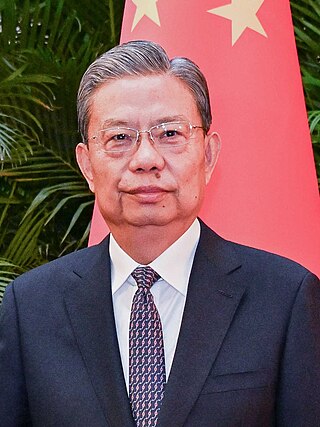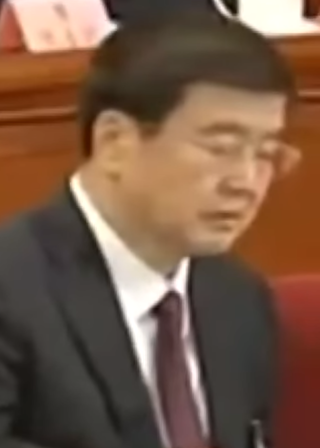
The Central Commission for Discipline Inspection (CCDI) is the highest supervisory organ of the Chinese Communist Party (CCP). The CCDI is under the control of the CCP Central Committee, per the principle of unified power. It is tasked with defending the party constitution, enforcing inner-party regulations, coordinating anti-corruption work, and safeguarding the core position of Xi Jinping in the CCP Central Committee and the party as a whole. Safeguarding the political position of Xi and the Central Committee is, officially, the CCDI's highest responsibility. Since the vast majority of officials at all levels of government are also CCP members, the commission is, in practice, the top anti-corruption body in China.

Zhao Leji is a Chinese politician who is the current chairman of the Standing Committee of the National People's Congress and the third-ranking member of the Politburo Standing Committee of the Chinese Communist Party.

The 17th Central Committee of the Chinese Communist Party was elected by the 17th Congress on 21 October 2007, and sat until the 18th National Congress in 2012. The 17th Central Committee is composed of full members and alternate members. It was followed by the 18th Central Committee of the Chinese Communist Party. A member has voting rights, while an alternate does not. If a full member is removed from the CC the vacancy is then filled by an alternate member at the next committee plenum — the alternate member who received the most confirmation votes in favor is highest on the order of precedence. To be elected to the Central Committee, a candidate must be a party member for at least five years.

Zhao Hongzhu is a retired Chinese politician and a previous member of the Chinese Communist Party's national leadership. Zhao served as the Deputy Secretary of the Central Commission for Discipline Inspection (CCDI), the Communist Party's anti-corruption agency, as well as a Secretary of the Central Secretariat.

Bagatur or Bater is a Chinese Communist Party politician of Mongol ancestry, formerly serving as the Chairman of the National Ethnic Affairs Commission. A career party functionary with background in the Communist Youth League, Bagatur steadily ascended the ranks of government, spending his entire career in Inner Mongolia. Between 2009 and 2016, he served as Chairman of Inner Mongolia.

The 18th Central Committee of the Chinese Communist Party was elected by the 18th National Congress on 15 November 2012, and sat in plenary sessions until the communing of the 19th National Congress in 2017. It was formally proceeded by the 17th Central Committee.
Liang Bin is a former Chinese politician from Shanxi province. He spent most of his career working in his home province, successively serving as the Party Secretary of the cities of Shuozhou and Xinzhou, before being transferred to Hebei province in June 2008 to head the party's provincial Organization Department. Liang was investigated by the Chinese Communist Party's anti-graft agency in November 2014.
The 18th Central Commission for Discipline Inspection (CCDI) was elected at the 18th National Congress of the Chinese Communist Party on 14 November 2012. Its 1st Plenary Session elected the Secretary, deputy secretaries and the 18th Standing Committee of the CCDI.
The 17th Central Commission for Discipline Inspection (CCDI) was elected at the 17th National Congress of the Chinese Communist Party on 21 October 2007. Its 1st Plenary Session elected the Secretary, deputy secretaries and the 17th Standing Committee of the CCDI.
The 16th Central Commission for Discipline Inspection (CCDI) was elected at the 16th National Congress of the Chinese Communist Party on 15 November 2002. Its 1st Plenary Session elected the Secretary, deputy secretaries and the 16th Standing Committee of the CCDI.
Han Yong is a former Chinese politician who served as chairman of the Shaanxi Provincial Committee of the Chinese People's Political Consultative Conference between 2016 and 2022. He spent his early career in his native Jilin province, before being transferred to work in Xinjiang in 2004, where he served as regional organization chief, deputy party chief, and political commissar of the Xinjiang Production and Construction Corps.

Yang Xiaodu is a Chinese retired politician who served as the first director of the National Supervisory Commission from 2018 to 2023. He served as a member of the 19th Politburo of the Chinese Communist Party from 2017 to 2022. From 2014 to 2022, he served as a Deputy Secretary of the Central Commission for Discipline Inspection (CCDI), the leading anti-graft body of the Chinese Communist Party. He has served in Shanghai and Tibet during his early political career.

The 19th National Congress of the Chinese Communist Party was held at the Great Hall of the People, Beijing, between 18 and 24 October 2017. 2,280 delegates represented the party's estimated 89 million members. Preparations for the 19th National Congress began in 2016 and ended with a plenary session of the Central Committee a few days prior to the Congress. In 2016, local and provincial party organizations began electing delegates to the congress as well as receiving and amending party documents. It was succeeded by the 20th National Congress of the Chinese Communist Party.

The 19th Central Committee of the Chinese Communist Party was elected by the 19th National Congress in 2017, and sat until the next National Congress was convened in 2022. It formally succeeded the 18th Central Committee of the Chinese Communist Party and preceded the 20th Central Committee of the Chinese Communist Party.
Shen Deyong is a Chinese politician and judge who served as the chairperson of the Social and Legal Affairs Committee of the Chinese People's Political Consultative Conference (CPPCC). At the height of his political career, he served as executive vice-president of the Supreme People's Court, the highest level of China's judiciary. Shen formally resigned from the government in June 2018, which was a shock to the news media.
Mo Jiancheng is a former Chinese politician who spent most of his career in both Inner Mongolia and Jiangxi. As of August 2017 he was under investigation by the Communist Party's anti-corruption agency. Previously he served as leader of the discipline inspection team sent by Central Commission for Discipline Inspection (CCDI) to Ministry of Finance (MOF) from December 2015 to August 2017, Deputy Communist Party Secretary of Jiangxi from January 2015 to December 2015, executive vice-governor of Jiangxi from July 2013 to September 2015, Communist Party Secretary of Baotou from November 2006 to April 2010, and Communist Party Secretary of Tongliao from January 2003 to December 2004. Mo worked with Su Rong for a long time.
Zhang Qi is a former Chinese politician who spent most of his career in Hainan province. He was investigated by the Central Commission for Discipline Inspection and the National Supervisory Commission, the highest anti-corruption agency of China, in September 2019. Previously he served as Chinese Communist Party Committee Secretary of Haikou, capital of Hainan province. Zhang is the first senior official who was placed under investigation in Hainan since the 19th National Congress of the Chinese Communist Party (CCP) in late 2017 and the fourth incumbent provincial level official was sacked for graft since then.

The 20th National Congress of the Chinese Communist Party (CCP), commonly referred to as Èrshí Dà, was held in the Great Hall of the People, Beijing from 16 to 22 October 2022. The National Congress is the highest organ of the party, and is stipulated to be held every five years. The conference had 2,296 delegates and 83 specially invited delegates.
The Standing Committee is the highest organ of the Central Commission for Discipline Inspection (CCDI) when the CCDI is not convened in a plenary session. It is composed of the secretary, deputy secretaries, secretaries general and other members. The composition of a standing committee is elected by the CCDI plenary session and approved by the CCP Central Committee at one of its plenary sessions. To be an eligible candidate for standing committee membership, one has to be an ordinary CCDI member already.
Li Xinran is a Chinese politician serving as the Secretary-General of the Central Commission for Discipline Inspection (CCDI) since 2022. Previously, he served as the Chief Inspector of the CCDI Discipline Inspection Office at the China Banking Regulatory Commission and the Chief Inspector of the CCDI and NSC Discipline Inspection Office at the China Banking and Insurance Regulatory Commission.






